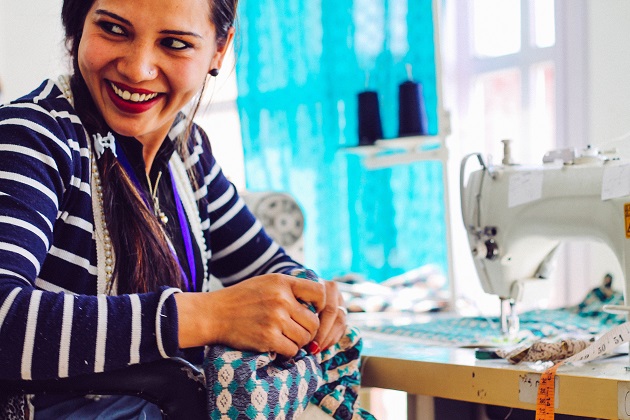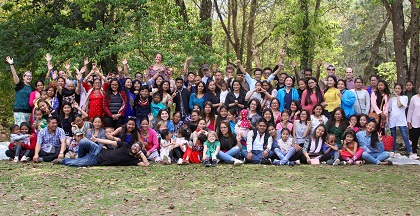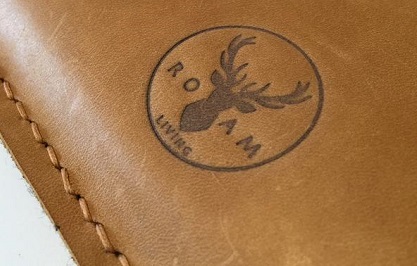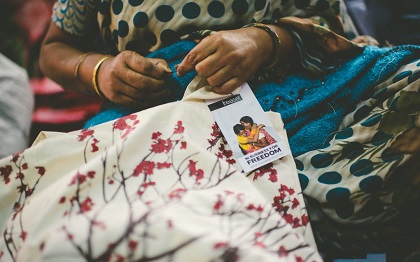Businesses like Purnaa, Made in Freedom and Roam Living are helping to change the textile industry by offering good jobs in a context dominated by exploitation.
 One of the eighty employees working in the Purnaa project. / Purnaa
One of the eighty employees working in the Purnaa project. / Purnaa
“Have you ever wondered who made your clothes? How much they’re paid, and what their lives are like?”
These were some of the questions raised by the Fashion Revolution movement some days ago, during its 2018 awareness week.
The movement started after the collapse of the Rana Plaza Building (Bangladesh) in April 2013. The accident caused the death of 1,138 textile industry workers, and showed the world their working conditions.
About 70 million people work in in the production of clothes, most of them are women between the ages of 18 and 35. Several interesting initiatives have emerged to create alternative and fair business models.
PURNAA: WHAT IS A “GOOD JOB”?
 Corban Bryant, co-owner of Purnaa, in Nepal.
Corban Bryant, co-owner of Purnaa, in Nepal.“A good job can change somebody’s life”, says Corban Bryant of Purnaa, a project started in Nepal in 2013. About 80 full-time jobs have been created by the company since then. Working in small teams, the staff produces fair trade knit tops, handbags, and hats.
“Good jobs are those that pay at least a living wage and that offer safe working conditions”. It is when such options are not available that people become vulnerable to exploitation, Bryant explains, “whether it’s labour exploitation, sexual exploitation, discrimination or domestic abuse”.
In Nepal, more than 40% of the population is unemployed. So, “instead of hiring only those with high skill levels already developed, we offer in-house training in both job skills and life skills”.
“When someone is making a living wage doing a job that fulfils a true economic need, they not only have a sense of accomplishment but also the necessary funds to pay for safe housing, children's schooling, healthcare, clean water, savings, ability to celebrate holidays, afford transportation, etc. A good job breaks poverty cycles in a sustainable and lasting way”, says the co-owner of Purnaa.
 Staff of Purnaa, in Nepal. / Purnaa
Staff of Purnaa, in Nepal. / PurnaaAt the end of the year, their success is measured looking at four areas of action: finances, society, environment and spirituality. “What gives us the most satisfaction and keeps us going are the transformed lives of our staff”, he concludes.
ROAM LIVING: WORK TO BUILD SELF-CONFIDENCE
“Many survivors often struggle to settle into employment after their ordeal of being trafficked”, says Leanne Rhodes. She works in Romania with Abolishion, an organisation against sex trafficking.
With the challenges of these women in mind, Abolishon created Roam Living, a brand of handmade nicely designed leather products such as laptop and notebook covers.
 ROAM Living produces hand-made leather products. / ROAM Living
ROAM Living produces hand-made leather products. / ROAM Living“I have been amazed at the healing that comes from doing work that matters and being able to make decisions for your own life instead of living on hand outs”, Rhodes says. “When the girls join our program we teach them how to work with the leather. We love how it builds their self confidence and the pride they show when they have completed each piece”.
But helping survivors goes beyond offering a job. “It is quite common that they will either lose or leave their first four or five jobs because of behavioural or trauma issues”. Ongoing education is needed, as well as “time off to do much needed counselling, therapy, and time to attend the medical and legal appointments that survivors so often have to face”.
The project just started in 2017 and is now looking for committed volunteers. The team dreams that their products will be “sold in retail stores all over the world; we want our products to be something people love to use but also where they love the story behind it”.
MADE IN FREEDOM: CHANGING MINDSETS
In Germany, Made In Freedom sells organic cotton t-shirts made with sustainable and fair materials. The clothes have been produced by women who have been liberated from the sex-trade industry.
 Armin Ruser of Made in Freedom.
Armin Ruser of Made in Freedom. “Our job in Germany is to bring these products into the awareness of people in Europe as well as selling and shipping the shirts”, Armin Ruser explains.
The production is in Kolkata, India.“There, over 200 women have been freed and offered jobs paying well above the national wage”.
Freeset is the partner organisation that “trains this women in sowing, printing”. The trust, started in 1999, also offers literacy courses, child care and debt management to its workers.
Can this model become a real alternative to the big textile companies? “The mills of politics and economy grind very slowly… especially when it leads to higher costs”, the MIF admits. “In our globalized world, the issue of human trafficking and industrial exploitation affects us all, that is why we need as many people as possible to contribute to a change in the textile industry”.
 Made in Freedom partners with Freeset to distribute clothes in Europe.
Made in Freedom partners with Freeset to distribute clothes in Europe. How are perceptions of consumers in Western countries changing? Are people ready to pay the real cost for fair trade clothes? A second article will address these issues.

Las opiniones vertidas por nuestros colaboradores se realizan a nivel personal, pudiendo coincidir o no con la postura de la dirección de Protestante Digital.
Si quieres comentar o